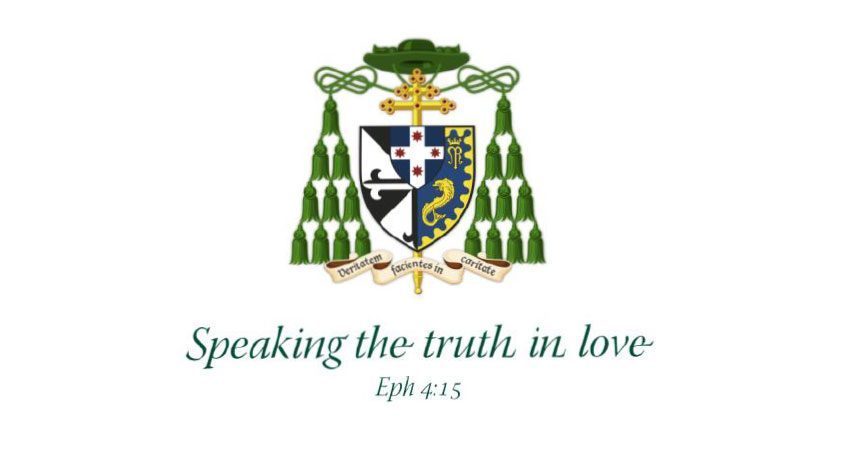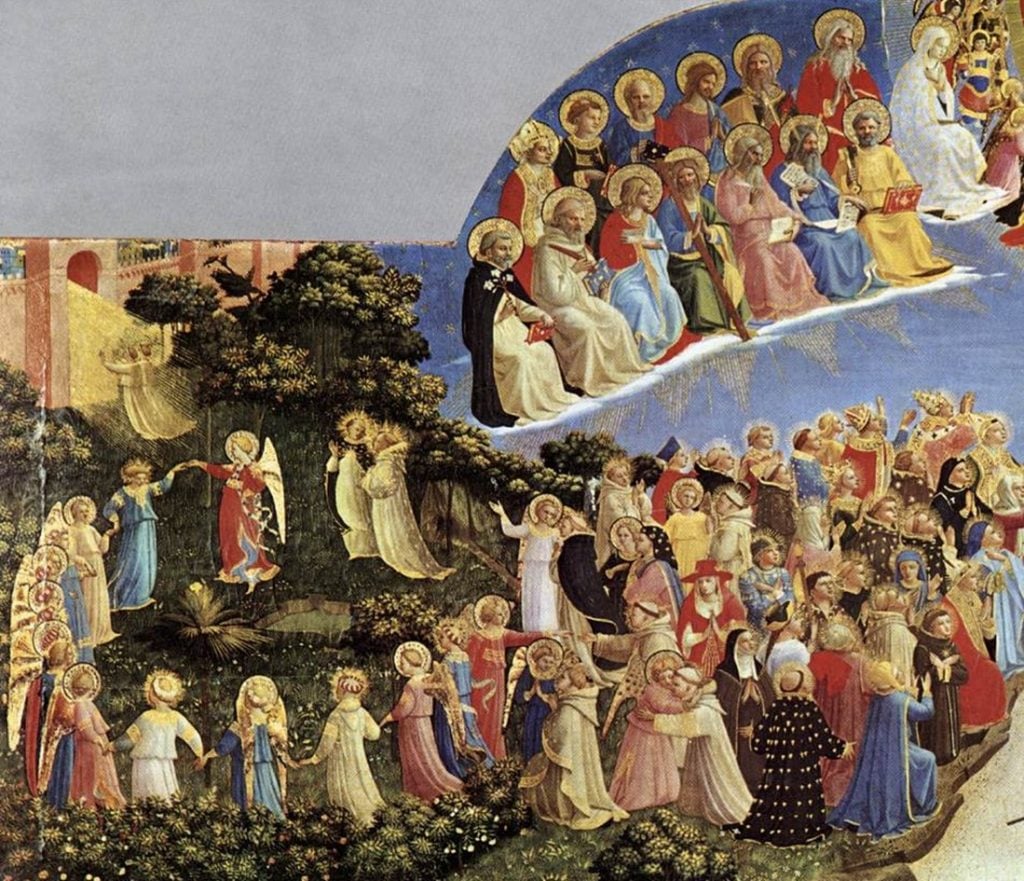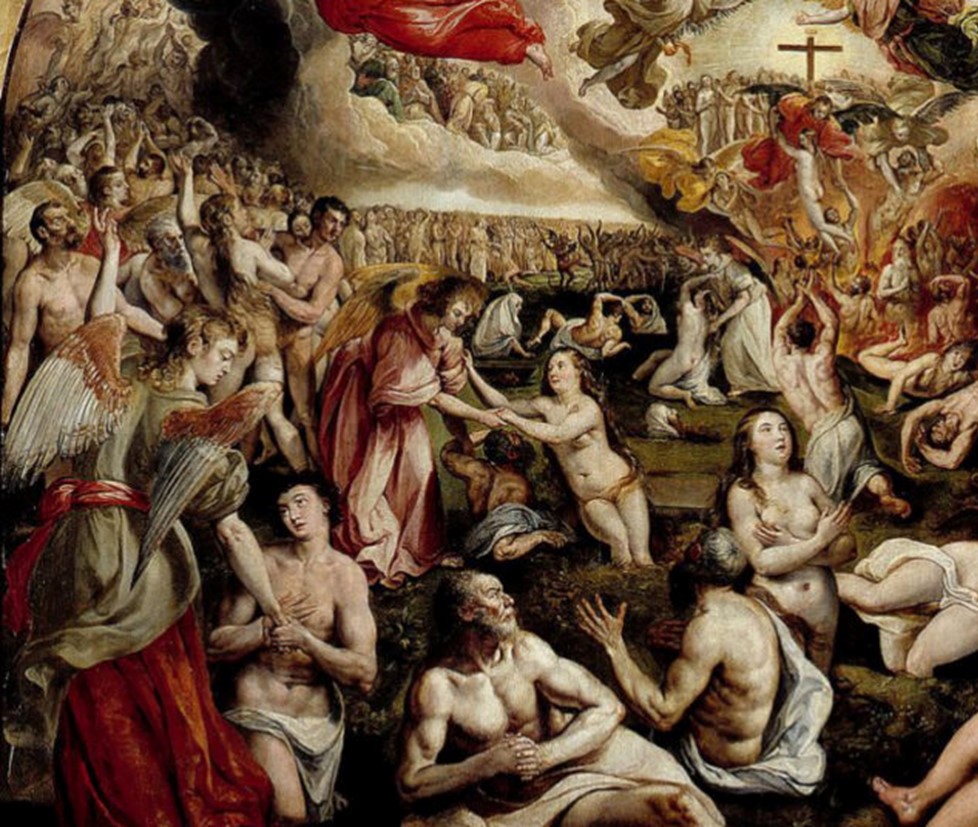HOMILY FOR MASS OF THE 32ND SUNDAY OF ORDINARY TIME YEAR B

St. Mary’s Basilica, Sydney, 7 November 2021
At the then-customary examination before Confirmation, a child was asked by a bishop to define Matrimony. She nervously recited from memory: “Matrimony is a place where souls suffer for a time after death on account of their sins.” Embarrassed that her pupil had given the definition of Purgatory rather than Matrimony, the nun in charge was about to correct the child when the Bishop intervened: “Hold on Sister, what would we know?”
This week past, this coming Thursday, and throughout November, we celebrate a month-long festival of the dead. It might sound morbid, but I want to suggest today that it is in fact cautionary, realistic and above all hopeful. This week’s recommencement of regular air travel suggests a way to understand this…

On All Saints Monday last we celebrated the passengers in First Class or Heaven, traditionally called the Church Triumphant, those so united to God and conformed to His will in this life that they are with Him now and forever. They are already enjoying a little bit of heaven even if, like the rest of us, they await the Resurrection of the Body and so their completion. So November is hopeful: it points to Heaven as the destination for which we are made.
Yet not everyone, we know, is quite ready for God at their death; some still need some realignment of the character for that. So on All Souls last Tuesday and Remembrance Day next Thursday we commemorate those in Business Class or Purgatory, sometimes called the Church Sufferingor Church Expectant. They are the dead, whose souls are now in spiritual hotel quarantine, being readied for the freedom of heaven. So November is hopeful but it is also realistic—about what’s yet be done to ensure we get to our heavenly destination.
Thirdly, on Halloween many children did the American thing of dressing up as ghosts or witches and roaming the streets in search of treats. Behind the commercialism and fun there’s a serious message: All Hallows Eve highlights that those in Economy Class, the Church Militant or Struggling here on earth, can offer spiritual treats of prayer and penance for the ghostly souls. But we too will die and as ghostly souls rely upon the Church to pray for us. In the meantime we must be inspired by, imitate and ask the intercession of those already sainted. November is cautionary: it warns that death approaches and we should be prepared.
Three classes, then, of Christians: saints, and souls, and souls-and-saints-to-be. All on one plane: the Church. With one pilot: Jesus Christ. Heading in the same destination: to Heaven. And the curtain between the classes is paper-thin, for we are intimately connected, we are in communion.
We commune with the saints on earth, our fellow believers, by our friendship and by sharing a common faith, sacraments and lives of service. In our first reading a poor widow prepares a last meal for her starving son (1Kings 17:10-16). In our Gospel another poor widow puts her all in the poor-box (Mk 12:38-44). These stand for the millions in our world barely subsisting, for whom starvation is an ever-threatening reality. Wars and pandemics also underline the vulnerability of all mortal flesh. None shall escape the judgment that Hebrews foretells “at the death of each one” and “at the end of the age” (Heb 9:24-28), that Mark foreshadows for the self-important, ungenerous scribes (Mk 12:38-44), or that the widow of Sidon hints at when she reminds Elijah, “and then we shall die”.

We commune with the saints-to-be on earth, but also with the holy souls or saints-to-be in purgatory. We intercede for them in every Mass, and in our own prayers on their anniversaries and always. In November, especially, we ask that particular Masses be offered for our dear departed and join our own prayers and sacrifices to these. Elijah’s prayer ensures meal aplenty and hope not just for himself but for his hostess and her son in their ‘purgatory’ on earth. Hebrews points to the heavenly sanctuary beyond all earthly ones, where Christ the Priest intercedes before the Father (Heb 9:24-28). This is precisely what we offer in our requiems and suffrages for the dead: not just widows’ mites but the “all-sufficing sacrifice for sins” that is Christ, offered at Calvary and in the Eucharist.
We commune with the saints in heaven by honouring them, imitating them, praying to them. We make joining their company the goal of our lives. When jar of flour and jug of oil prove endless, when our epistler talks of Christ’s return “at the end of the age”, when Mark points to those ungenerous men whose sentence will be severe, we know the vindication of widows and orphans is coming.
Three classes, then, of Christians—saints, and souls, and saints-and-souls-to-be—all on one ecclesial flight, all headed to heaven. November is a month long celebration of promise, intercession and preparation for death, strengthening the communion between the living and the dead and those, in a sense, in-between.
In Mexico the festival of El Dia de los Muertos was celebrated this past week: the dead were remembered, their graves decorated, parades and parties celebrated in their honour. It might sound strange to anyone grieving or from a culture inclined to silence around death. But it highlights a very Catholic under-standing that the curtains between All saints, All souls, and All of us is paper thin and we can glimpse each other through them.
On All Saints Day this week, a friend of mine from school and university days passed beyond that veil. She had been stalked by cancer since her late teens but her indomitable spirit was charged with hope and practicality. She devoted her adult life as a clinical psychologist to helping others with life-threatening illnesses. Twenty years ago she was made a Member of the Order of Australia for her support for young adults with cancer. She died too soon, before all could say their goodbyes. Yet in a few moments I will confess “one Holy Catholic Church” on earth, in purgatory and in heaven, one communion of saints, of souls, and of saints-to-be. I profess my sure and certain hope, in “the forgiveness of sins, the resurrection of the body and life everlasting”. And so I know I can still express my friendship for my recently deceased friend by praying that God will “open the gates of paradise to her and help us who remain to comfort one another with assurances of faith, until we all meet again in Christ.”
WORD OF THANKS AFTER MASS, 7 November 2021
My thanks to you all for your participation in our Mass: it’s great to have you back home!
A reminder that the euthanasia bill will be debated in parliament later this week and beyond. Please contact your MPs to explain why as believers and voters we want our state to protect the lives of all citizens and invest in their better care, rather than killing some or enabling their lives to be shortened. Ideas on how and what you might say can be found at www.noeuthanasia.org.au.
This coming Saturday Bishop Robert Barron will launch our “Reclaiming Evangelisation” series live online at 11am. You are invited to join in that campaign also, by taking part in these seminars and in the evangelisation of Sydney thereafter.
Finally, as November is the month of remembrance of the dead, there are envelopes at the doors for anyone who would like Masses said for any of their dear departed or for all the Holy souls.
A warm welcome to St Mary’s Basilica in Sydney for the Solemn Mass of the 32nd Sunday in Ordinary Time. With lockdown behind us and even greater freedoms from tomorrow, we give thanks to Almighty God that we can gather again for Mass, but we continue to pray for an end to the pandemic. As we confess our sins in words and implore God’s mercy in song, we prepare ourselves to celebrate the sacred mysteries…

